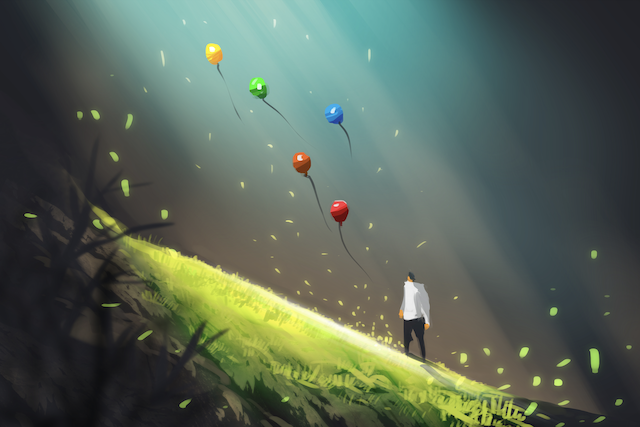
“One of the hardest things I’ve had to understand is that closure comes from within. Especially difficult if you’ve been betrayed by someone you love because you feel like you gotta let them know the pain they caused, but the peace you seek can only be given to you by you.” ~Bruna Nessif
Many years ago, I wrote a very personal post for Tiny Buddha titled Get Past It Instead of Getting Even: Revenge Isn’t Winning.
The post described the challenges I experienced with my parents as an adult and, ultimately, my decision to cease all relations with them.
Such a decision was by no means easy or hastily made.
It required many years of guidance and counseling to accept that sometimes such a drastic decision is necessary for maintaining one’s mental health and the health of other meaningful relationships.
Over the years, I have experienced sharp criticism for that decision to dissociate from my parents. I’ve been branded an awful son, self-centered, and even a hypocrite based on my writings when compared to the reality of my familial relationship.
I understand the criticisms because I once was on the opposite side of where I am now, with a seemingly perfect family relationship that others envied.
I was quick to judge those estranged from their families with some of the same criticisms now cast at me.
I was simply unable to fully grasp how it was possible that a bloodline connection could ever be severed, and how life could go on without their presence.
But what we see often differs from reality, and perfection is unsustainable and unattainable when it comes to family relations.
Before you know it, you have transformed from the harshest critic to the pitiable object, constantly wondering how lifelong relationships could quickly deteriorate with such hatred and anger.
But the passage of time, combined with age and life’s unending volatilities, alters one’s perception and relaxes the emotions we once believed would extinguish our joy, sanity, and quality of life.
This new perspective is an unanticipated sensation after such a tumultuous experience, and suddenly, the word “closure” is no longer foreign to one’s vocabulary.
An Attempt at Reconciliation
It was early December, and homeownership again handed me an unexpected repair project in my kitchen. It appeared easy enough at first but became much more complicated once I understood the problem.
Pausing momentarily to decide how best to proceed, given that a clever solution was necessary if I did not want to incur a hefty repair cost, I immediately began thinking about my father.
Growing up, my father and I were incredibly close.
We spent a great deal of time in each other’s company, sharing long conversations with him mentoring me on the mechanical skills he was so adept with.
Sitting on my kitchen floor, lost in a sea of nostalgia, I realized how invaluable those conversations and his mentoring were. How other invaluable life lessons often sprouted from those conversations. And how, regardless of all that had occurred, I considered myself grateful that he was my father.
As tears began pooling in my eyes, I decided I had to reach out to him at that moment, sharing my nostalgia and gratitude while naively hoping this might be the impetus we needed to reconnect.
Fearing my mother would intercept any hard-copy communication, I turned to social media and sent him a private message through his Facebook page.
My message to my father was 436 words long.
At the start, I acknowledged how the passage of time and age softens our perspectives, lessens the bitterness, and enables us to see and appreciate things we took for granted in the past.
I acknowledged how we all played a role in our eventual separation, how conversations could have been handled differently and more beneficially, and how blame at this point was futile.
I reminisced about our relationship, his teachings, our obsession with car care, and how, regardless of our separation, the memories we shared would live in my heart and mind forever.
It was sincere and sentimental, filled with a hopeful optimism about reconnecting with a person I have missed greatly over the years.
I am unashamed to admit that after writing those 436 words and reviewing them several times afterward, I cried, not necessarily for the loss that I still bore, but over my capacity to look beyond this unhappy part of my past and attempt to reconcile it.
Closure Comes from Within
For two weeks, I checked my Facebook account constantly, excited over the prospect of renewing our relationship.
I understood that even if things did not turn out as I hoped, I was glad he knew how I was feeling and what I was thinking.
Then, after two weeks and one day, on a sunny, fifty-degree afternoon in early December, my inbox alerted me that I had a response to my private Facebook message.
I probably waited ten minutes before finally opening the message, hopeful that the passage of time, combined with age and life’s unending volatilities, had altered his perception and relaxed his emotions.
Sadly, it had not.
My father’s response was thirty-seven words long and void of all sentimentality.
Narcissistic tendencies, the catalyst for our eventual separation, were still painfully evident in his opening sentence: “You have no idea what has happened to us, and I am not going to tell you.”
His overall indifference toward the content of my message was obvious when he said, “Don’t play up to me,” which revealed his doubtfulness over my sincerity.
Though short, his words were incredibly telling, confirming what I had feared and why I was so skeptical about reaching out to my parents earlier.
Author Mandy Hale says it best: “To get over the past, you first have to accept that the past is over. No matter how many times you revisit it, analyze it, regret it or sweat it… it’s over. It can hurt you no more.”
Though a decade and a half has passed, the past is very much a part of my parents’ present.
Unexpected misfortunes like my father referenced often have a redemptive effect on an individual’s long-standing resentments, but they appear to have only intensified theirs.
There has been no personal growth, no self-admissions, and no remorse of any kind. Honestly, I am astonished by their incapability.
While I know many hurtful exchanges transpired between my parents and me, I have not allowed them to define my past or clutter my present. I do not want to be a victim but rather a witness to a mishandled situation that belongs in the past.
My parents, on the other hand, have branded themselves “the victims” for so long while manipulating the narrative to suit that claim that I am not even sure they know what the truth is any longer, and that is a very sad place to find oneself.
Several days after receiving my father’s short response, I thought I would be overcome with sadness and grief, immobilized by the realization that my family would never be whole again.
But something unexpected occurred instead.
I began to feel at peace.
While not the ideal conclusion, the situation has now been resolved.
I will no longer feel guilty about not trying to reconcile, no longer question if my father is missing our relationship or not, and no longer crave an outcome that I now understand is impossible.
And so, I can finally and definitively assign closure to the unfortunate end of my familial relationship.
Did I want my situation to turn out differently? Of course.
But meaningful relationships cannot be sustained by living in a questionable past while refusing to acknowledge any failings that need to be remedied.
Regardless of who is at fault, I encourage anyone in similar circumstances to reach out to those whose presence still lingers in their heart and minds.
I do not encourage this solely as a possibility for reconciliation, but rather for the ability to find peace in the truth, whether good, bad, or indifferent.
Closure often springs from the acceptance of that truth and the understanding that healing can still occur even if our efforts are not reciprocated.
About Craig Ruvere
Craig Ruvere is an awarded writer, marketer and designer living in Northern Colorado. He runs the popular blog The View from Here, sharing insights about life, love and everything in between.













 Though I run this site, it is not mine. It's ours. It's not about me. It's about us. Your stories and your wisdom are just as meaningful as mine.
Though I run this site, it is not mine. It's ours. It's not about me. It's about us. Your stories and your wisdom are just as meaningful as mine. 